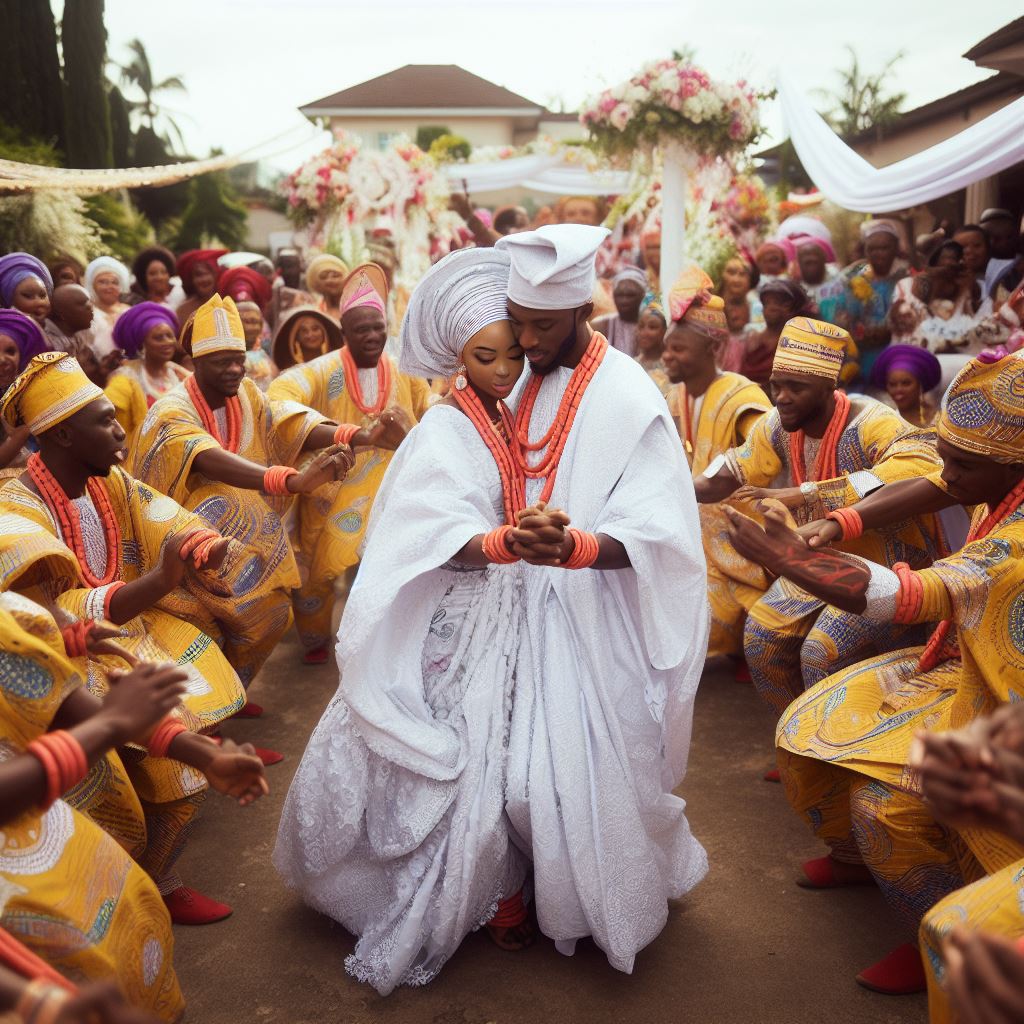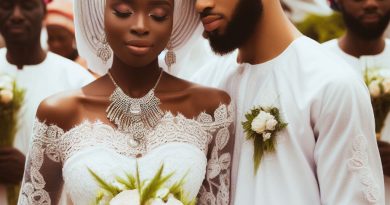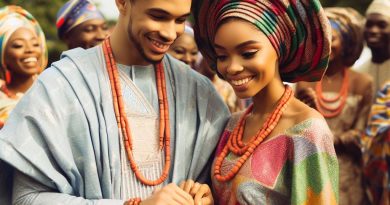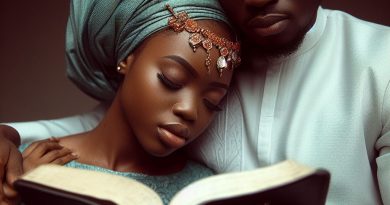Music and Dance: Essential Elements of a Nigerian Wedding
Last Updated on January 28, 2024
Introduction
A. Nigerian Weddings
Nigerian weddings are vibrant, celebratory affairs, steeped in tradition and cultural significance. They are grand social events.
B. Significance of Music and Dance
In Nigerian culture, music and dance are more than mere forms of entertainment; they are deeply ingrained in the fabric of life.
C. Thesis Statement
This section explores the fundamental role of music and dance in Nigerian weddings, highlighting their irreplaceable importance:
- Cultural Roots: Music and dance in Nigeria reflect the diverse ethnic groups and traditions, connecting people to their heritage.
- Celebration and Unity: These elements unify families and communities, fostering an atmosphere of joy and togetherness.
- Rituals and Symbolism: Music and dance are integral to wedding ceremonies, symbolizing love, commitment, and blessings.
- Modern Influences: Nigerian weddings today blend traditional and contemporary music and dance, creating a fusion of old and new.
- Memorable Experiences: Music and dance elevate weddings, creating unforgettable moments for couples and guests alike.
Traditional Nigerian Wedding Music
Nigerian weddings are known for their vibrant and lively atmosphere, and music and dance play a significant role in creating this joyous ambiance.
Traditional Nigerian wedding music encompasses a wide range of genres that reflect the rich cultural heritage of the country.
A. Genres of Traditional Nigerian Wedding Music
1. Afrobeat
One of the genres commonly heard at Nigerian weddings is Afrobeat.
Afrobeat emerged in the 1970s, blending traditional African rhythms with Western jazz and funk influences.
Its infectious beats and lively melodies are sure to get everyone on the dance floor.
2. Highlife
Another popular genre is Highlife, which originated in Ghana but quickly spread to Nigeria.
Highlife is characterized by its uptempo rhythms and melodious guitar lines.
It creates a joyful and celebratory mood, perfect for dancing and merriment.
3. Juju
Juju is another genre deeply rooted in Nigerian wedding traditions.
Combining traditional Yoruba rhythms with Western instruments like guitars and keyboards, Juju music creates a fusion of cultural and modern sounds.
Its rhythmic beats and engaging melodies captivate audiences and inspire them to dance.
4. Fuji
In southwestern Nigeria, Fuji music takes center stage at weddings.
Fuji is a genre that blends traditional Islamic music with Yoruba percussion and Western influences.
Its energetic rhythms and soulful vocals provide an enchanting musical experience, reflecting the diverse cultural landscape of the region.
5. Apala
Apala, a traditional Yoruba genre, also holds significance in Nigerian wedding music.
Known for its percussion-heavy sound and storytelling lyrics, Apala songs narrate tales of love, relationships, and communal experiences.
The rhythmic patterns and poetic lyrics make Apala a cherished genre in Nigerian wedding celebrations.
6. Makossa
Makossa, a Cameroonian genre, has also gained popularity in Nigerian weddings.
Makossa’s lively beats and danceable rhythms create an infectious groove that gets guests moving.
Its upbeat nature adds a festive touch to the celebration, ensuring an unforgettable experience for everyone involved..
B. The Role of Live Bands and Traditional Musical Instruments
1. Live bands
- Live bands play a crucial role in Nigerian weddings, providing energetic and engaging performances.
- Live bands are an integral part of Nigerian weddings, adding live performances and excitement to the event.
- These bands consist of talented musicians who bring the music to life and create an atmosphere of celebration.
- They engage the audience, encourage dancing, and ensure that everyone has a memorable time.
- The live bands create an atmosphere of celebration, encouraging guests to dance and participate in the festivities.
2. Traditional musical instruments
- Traditional musical instruments play a vital role in Nigerian wedding music.
- Instruments like the talking drum, shekere, ogene, and kalangu add a distinct cultural flavor to the music.
- The rhythmic beats and unique sounds produced by these instruments connect the wedding to Nigeria’s cultural heritage and create a sense of identity and pride.
- The use of traditional instruments adds a unique flavor to the music, connecting the wedding to Nigerian cultural heritage.
C. The Importance of Lyrics and Storytelling in Nigerian Wedding Songs
- Lyrics in Nigerian wedding songs often convey messages of love, unity, and blessings for the couple.
- Storytelling is an essential element in these songs, as they narrate the couple’s journey and celebrate their union.
- The lyrics and storytelling in Nigerian wedding songs contribute to the emotional and sentimental nature of the occasion.
- These songs serve as a way to honor the couple’s families, ancestors, and cultural traditions.
In Nigerian wedding songs, lyrics and storytelling hold great importance. The lyrics convey messages of love, unity, and blessings for the couple.
They celebrate the couple’s journey and honor their families, ancestors, and cultural traditions.
These songs evoke emotions and create a sentimental atmosphere, touching the hearts of everyone present.
Music and dance are essential elements of a Nigerian wedding, bringing people together, fostering a sense of community, and celebrating love and unity.
Whether it’s the diverse genres of traditional Nigerian wedding music, the electrifying performances of live bands, or the emotional storytelling through lyrics, music sets the stage for an unforgettable celebration of the couple’s union.
Read: Understanding the Christian Perspective on Marriage in Nigeria
Modern Nigerian Wedding Music
A. The emergence of contemporary Nigerian wedding music
- Contemporary Nigerian wedding music has evolved due to changing tastes and influences.
- Traditional wedding music is intertwined with modern styles to create a unique and enjoyable experience.
- Young couples desire music that reflects their personal style and resonates with their generation.
- The emergence of contemporary Nigerian wedding music has created a fusion of traditional and modern sounds.
- Artists and producers have adapted to the changing demands, incorporating new elements into their compositions.
B. The influence of popular Nigerian music genres like Afrobeats and Highlife
- Afrobeats, a popular genre, has greatly influenced modern Nigerian wedding music.
- The infectious rhythms and catchy melodies of Afrobeats bring energy and excitement to the celebrations.
- Highlife, a genre rooted in traditional Nigerian music, provides a nostalgic touch to wedding ceremonies.
- Artists often infuse elements of Highlife into their songs, creating a blend of old and new styles.
- The influence of these genres has made contemporary Nigerian wedding music internationally appealing.
C. The use of DJs and sound systems in modern Nigerian weddings
- DJs and sound systems play a crucial role in modern Nigerian weddings, enhancing the overall experience.
- They are responsible for selecting and mixing music to keep the guests entertained throughout the event.
- DJs often incorporate a variety of genres and styles into their playlists to cater to diverse musical preferences.
- The use of professional sound systems ensures high-quality sound and amplifies the energy of the music.
- DJs also act as MCs, guiding the flow of the event and interacting with the audience, creating a lively atmosphere.
Modern Nigerian wedding music has experienced a significant transformation, blending traditional and contemporary elements.
Genres like Afrobeats and Highlife have left their mark on the musical landscape, attracting both local and international attention.
DJs and sound systems have become integral to weddings, providing exceptional music and creating a vibrant ambiance.
As Nigerian weddings continue to evolve, modern music and dance remain essential elements, reflecting the rich cultural heritage and contemporary influences of this vibrant country.
Read: The Moral Implications of ‘The Bed Undefiled’ in Today’s Society
Traditional Nigerian Wedding Dances
A. Different Traditional Nigerian Wedding Dances
- Igbo Traditional Dance: The Igbo people celebrate their weddings with the “Igba Nkwu” dance, characterized by energetic movements and vibrant music.
- Yoruba Traditional Dance: The Yoruba tribe performs the “Aso Ebi” dance, which involves rhythmic steps and colorful attire reflecting their rich cultural heritage.
- Hausa Traditional Dance: Hausa weddings feature the “Kamu” dance, a graceful and elegant performance that showcases the beauty of their traditional costumes.
B. Cultural Significance behind each dance
- Igbo Traditional Dance: The “Igba Nkwu” dance symbolizes joy, unity, and the coming together of families. It represents the celebratory nature of Igbo weddings.
- Yoruba Traditional Dance: The “Aso Ebi” dance is deeply rooted in Yoruba traditions and signifies the importance of communal support and unity during special occasions.
- Hausa Traditional Dance: The “Kamu” dance is a way of expressing joy and happiness during a wedding. It also serves as a cultural display of the bride’s family.
C. Involvement of family members and guests in the dance performances
- Igbo Traditional Dance: Family members and guests actively participate in the “Igba Nkwu” dance, joining the couple on the dance floor to share in their joyous celebration.
- Yoruba Traditional Dance: The “Aso Ebi” dance involves not only the bride and groom but also their families and friends who dance together in synchronized movements.
- Hausa Traditional Dance: During the “Kamu” dance, close relatives and friends of the bride showcase their dancing skills while guests cheer them on, creating a festive atmosphere.
In short, traditional Nigerian wedding dances hold significant cultural value and play a central role in uniting families and communities.
The Igbo, Yoruba, and Hausa tribes each have their own unique dances that reflect their heritage and customs.
These dances bring joy and excitement to the wedding festivities, allowing family members and guests to actively participate and create lasting memories.
Read: Marriage in Scripture: Honour, Love, and Faithfulness Unveiled

Modern Nigerian Wedding Dances
A. Popular modern Nigerian wedding dance trends
- Nigerian couples are embracing modern dance styles at their weddings.
- Popular dance trends include the Shaku Shaku, Zanku, and Legwork.
- The Shaku Shaku involves fast-paced footwork and body movements.
- Zanku, influenced by the Zanku Legwork dance, is a blend of leg movements and energetic vibes.
- Legwork showcases intricate leg movements and footwork on a fast-paced beat.
- These modern dance trends add excitement and entertainment to Nigerian weddings.
- Guests often join in, creating a vibrant and memorable atmosphere.
- Nigerian wedding dance trends continue to evolve as new styles emerge.
- Couples are encouraged to showcase their unique dance moves to make their weddings stand out.
B. Influence of social media and cultural exchange on these dances
- Social media platforms play a significant role in popularizing modern Nigerian wedding dances.
- Dance videos and tutorials are widely shared, allowing people to learn and imitate the moves.
- Through social media, these dance trends spread across Nigeria and even internationally.
- Cultural exchange plays a vital role in the development of modern Nigerian wedding dances.
- Artists collaborate and share their dances, blending different cultures and styles.
- These shared experiences bring people together and celebrate Nigeria’s rich cultural heritage.
- Cultural exchange enhances creativity and adds diversity to modern Nigerian wedding dances.
- International influences also find their way into these dances, creating a fusion of styles.
- The influence of social media and cultural exchange ensures that these dances remain dynamic and evolving.
C. The role of choreography and dance groups in modern Nigerian weddings
- Choreography plays a crucial role in the execution of modern Nigerian wedding dances.
- Professional choreographers work closely with couples to create stunning dance performances.
- They incorporate the couple’s personalities and preferences into the choreography.
- Dance groups also contribute to the overall success of modern Nigerian weddings.
- They provide synchronized and well-coordinated dance routines that entertain the guests.
- Dance groups practice meticulously to ensure flawless performances on the wedding day.
- These groups not only showcase their talent but also elevate the energy of the event.
- Having a choreographed routine adds a touch of glamour and professionalism to the wedding.
- Modern Nigerian weddings recognize the importance of dance groups and choreography as essential elements.
In fact, modern Nigerian wedding dances have become an integral part of the celebration.
Couples now incorporate popular dance trends, influenced by social media and cultural exchange.
Choreography and dance groups play vital roles in bringing these dances to life, creating unforgettable moments for the couples and their guests.
The evolution of these dances ensures that Nigerian weddings remain vibrant and reflective of the country’s diverse cultural heritage.
Read: Overcoming Marital Strife: Honouring the Promise of Forever in Nigeria
Gain More Insights: Traditional Yoruba Marriage Wishes & Their Meanings
The Role of Music and Dance in Nigerian Wedding Celebrations
A Nigerian wedding is incomplete without the vibrant and lively music and dance performances.
These essential elements play a crucial role in creating an energetic and joyful atmosphere throughout the celebrations.
A. Creating an Energetic and Joyful Atmosphere
- Music and dance have the power to uplift the spirits of everyone present at a Nigerian wedding.
- The rhythmic beats and melodious tunes make it impossible for people to resist the urge to dance and join in the celebration.
- The infectious energy spreads like wildfire, creating a joyful ambiance and setting the tone for the entire event.
- Whether it’s traditional Nigerian music or modern Afrobeat, the upbeat rhythms and catchy melodies effortlessly bring people together, transcending age, social status, and background.
- These infectious tunes encourage even the most reserved individuals to let loose, creating an atmosphere filled with laughter, smiles, and pure happiness.
B. Cultural Preservation and Identity
- Music and dance hold significant importance in preserving and showcasing Nigerian cultural heritage.
- Traditional Nigerian songs and dances are passed down through generations and have become an essential aspect of wedding celebrations.
- These cultural performances serve as a reminder of Nigeria’s rich history and traditions, allowing the younger generation to connect with their roots.
- Through music and dance, the cultural identity is preserved and celebrated, ensuring that tradition is not lost amidst modern influences.
- Nigerian weddings often include performances by local cultural dance groups, dressed in traditional attire.
- The energetic movements and rhythmic steps showcase the beauty and diversity of Nigerian dance forms, keeping the cultural heritage alive for future generations.
C. Social and Emotional Aspects of Music and Dance
- Music and dance during Nigerian weddings serve as a powerful social and emotional tool for attendees.
- It is a time when people come together to celebrate love, unity, and happiness. These elements enhance the bond between family members, friends, and the couple getting married.
- As guests participate in the dance performances, they form connections, build relationships, and strengthen existing bonds.
- Dancing side by side creates a sense of unity and community, allowing everyone to feel involved and connected.
- The emotional aspects of music and dance are equally significant. Nigerian weddings are marked by heartfelt expressions of joy, nostalgia, and love.
- During special dance performances, emotions run high, as family and friends celebrate the union of two individuals and their journey of lifelong companionship.
- Moreover, music and dance also act as a platform for self-expression.
- Attendees have the chance to showcase their individuality, creativity, and talent through various dance moves and singing along to beloved songs.
- This creates an outlet for personal emotions and allows everyone to feel a sense of belonging.
Generally, music and dance play an indispensable role in Nigerian wedding celebrations.
From fostering an energetic and joyful atmosphere to preserving cultural heritage and providing a platform for social and emotional connections, they bring life and soul to these joyous occasions.
See Related Content: Marriage Registry vs. Church Wedding: What’s Legal?
Conclusion
A. Importance of Music and Dance in Nigerian Weddings
Music and dance are the heartbeat of Nigerian weddings. They infuse energy, joy, and unity into these celebrations. They connect people and create lasting memories.
B. Cultural Significance in Nigerian Society
These elements hold deep cultural significance in Nigerian society, representing heritage, tradition, and the coming together of families. They bridge the past and the future.
C. Encouragement to Experience Nigerian Wedding Music and Dance
We encourage you to experience the magic of Nigerian wedding music and dance.
Attend a Nigerian wedding or explore cultural events and performances.
Immerse yourself in the vibrant rhythms and dances that tell stories of love and tradition.
It’s a journey worth taking, offering a unique glimpse into the heart and soul of Nigeria’s rich cultural tapestry.


